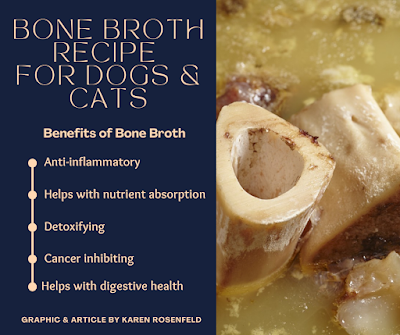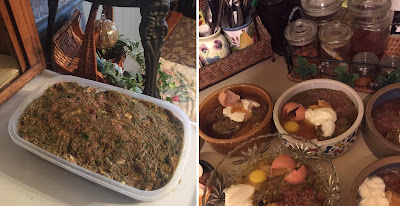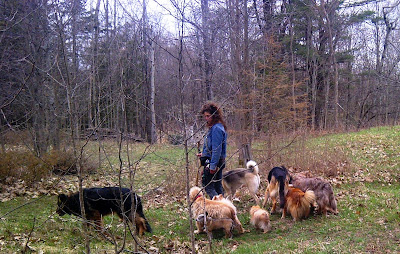Homemade Broth for Dogs, Cats - Bone, Chicken, Meat or Vegetable Broth
★ 6.5 min read
In this Article:
- Hydration
- Arthritis, Cancer and other Inflammatory Disease
- Nutrient Absorption, Detoxification, Oxygenation
- Digestive Tract Issues
- Recovery From Injury, Surgery and Poor Appetite
-
Renal and Kidney Health
- Oral Health
3.0 Bone Broth Recipe for Dogs and Cats
4.0 Optional Boost for Oral and Digestive Health
5.0 Bone Broth Serving Recommendations
7.0 Cautions
1.0 Health Benefits of Bone Broth for your Dog and Cat
1.1 Hydration
Dogs and Cats on a Dry Food Diet
During the digestive process, dry food draws moisture from the digestive system and can cause clinical dehydration. Dogs and cats that drink very little water or other fluids are at risk of dehydration and other health issues such as urinary tract crystals and stones.
Dry food (kibble, and other highly processed food products) is formulated
in direct contradiction to a dog and cat’s species appropriate diet.
If your dog or cat is currently on a dry food diet I encourage you to transition them to a species appropriate diet (raw diet or gently cooked and fresh food diet).
1.2 Arthritis, Cancer and Other Inflammatory Disease
MSM (Methylsulfonylmethane)
Bone
broth made from pastured grass fed animal bones is a good source of
methylsulfonylmethane (MSM) a form of naturally occurring sulfur that is
present in all vertebrates. Dogs with cancer are often deficient in sulfur. Sulfur performs multiple actions that make it difficult for cancer and inflammation to spread.
MSM is Anti-inflammatory
- MSM protects against oxidative stress by supporting the bodies ability to produce glutathione.
- Glutathione is one of the most important antioxidants produced naturally by the body.
- Glutathione cannot be produced without sulfur.
- MSM is used to help alleviate the symptoms of arthritis.
Sulfur
Sulfur
strengthens collagen. Collagen is an amino acid that gives strength to
many structures in the body (e.g. bone, connective tissue, skeletal
muscles, etc.); Collagen:- Helps hamper the spread of cancer, and may turn malignant tumors into benign tumors.
- Helps to repair the damage from chemotherapy.
- Helps to re-balance the body's pH level from acidic to alkaline - cancer and other diseases thrive in an acidic environment.
- Dogs, cats and people that are suffering from cancer have an acidified body pH level.
1.3 Nutrient Absorption, Detoxification, Oxygenation
- Nutrients into cells.
- The transfer of waste product and toxins out of cell.
- Sulfur helps to oxygenate the blood.
1.4 Digestive Tract Issues
Diarrhea
If your dog or cat has just experienced a bout of diarrhea and you have fasted him/her for a day and you want to start re-introducing food to his/her diet - you can start by offering your dog or cat a bowl of bone broth. Bone broth when made properly is rich in nutrients and easy on the digestive system.
Leaky-Gut Syndrome
If your dog or cat has leaky-gut syndrome bone broth can help with cell repair. Bone broth contains substances that are important for intestinal cell health - these substances include:
- Collagen
- Gelatin
- Glycine
- Proline
Leaky-Gut Syndrome
If your dog or cat has leaky-gut syndrome bone broth can help with cell repair. Bone broth contains substances that are important for intestinal cell health - these substances include:
- Collagen
- Gelatin
- Glycine
- Proline
1.5 Recovery Aid For Injury, Post Operative Care, Poor Appetite
If your dog or cat has just had surgery or a oral injury, is older and has a suppressed appetite bone broth can be added to the daily diet to help deliver needed nutrients.
1.6 Renal and Kidney Health
kidneys
and ureters, bladder and urethra health
Bone broth supports renal health. The kidneys, bladder and
liver rely in the presence of moisture to flush unwanted substances from the body. When moisture is in short supply the organs
cannot function efficiently. Eventually this can cause inflammatory issues.
For example:
- Kidney issues and disease
- Fatty lipomas
- Urinary tract infections
- Crystals and stones in the bladder and kidney
1.7 Oral Health
Dry food is often promoted as 'good' for oral health. However, dry food IS actually oral health damaging. Dry food is a leading cause of gingivitis and periodontal disease. In the absence of moisture particles of food
remain on a dog or cat’s teeth. Without sufficient moisture to flush the
particles away, bacteria forms, and then plaque.
2.0 How to Select The Best Bones for Making Bone Broth
2.1 Pastured, Free Range v.s Factory Farm Sourced Bone
Animals (e.g. chicken, cows, ducks, pigs, turkeys) raised in *concentrated animal feeding operations (CAFO) animals spend their short life, living in miserable conditions. CAFO **animals are fed a toxic, species inappropriate diet. Many of these toxins (e.g. lead and other heavy metals, drug residue) remain in the animal's flesh and bones after slaughter. I recommend broth and bone broth not be made with factory farm sourced animal flesh and bones.
If you want to make health supporting bone broth use bones sourced from pastured, free-range or organic pasture, free range. The second best choice is bones sourced from organic raised animals.
Learn more here, about intensively farmed animals, how animal protein, fat and bones sourced from these animals can adversely effect the health of your dog and cat.
* also known as: factory farms, industrial farms
** also known as: factory farm-raised, intensively farmed
2.2 What Type of Animal Bones Are Best
- Poultry and Fowl
- Chicken, duck, pheasant, quail, etc.
- Small Pray
- Cavie, rabbit, etc.
- Ruminants, Cloven Hoof
- Cow, bison, deer, goat, lamb, llama, oxen, venison, wild boar, etc
- Wild-caught Fish
- Whole or parts
- To select the best options, go to this article.
3.0 Bone Broth Recipe for Dogs and Cats
- Stainless steel, non-coated stock pot, or;
- Slow cooker.
Preparation
2. Fill the pot with water. Leave a few inches unfilled at the top of the pot.
- For every gallon of water you use, add:
- 1 to 1.5 tsp of organic unpasteurized, unfiltered apple cider vinegar (ACV), or;
- Fresh juice of one whole lemon.
- The natural acids in the ACV and lemon help to break down the bones which releases the healthful minerals from the bones into the broth as it cooks
3. Optional ingredients, if using add to the pot.
- Optional Herbs:
- ½ tbs of dry or fresh finely chopped sage.
- ½ tbs of dry or fresh finely chopped basil.
- ½ tbs of dry or fresh finely chopped marjoram.
- ½ tbs of dry or fresh finely chopped rosemary (not for animals with seizure conditions)
- 5 to 10 juniper berries
- Optional Veggies:
- Carrots
- Celery
- Celeriac
- Parsnips
- Optional Medicinal Mushrooms:
- Medicinal Mushrooms should only be added to the broth 20 minutes prior to removing the bone broth from the heat.
- For a list of appropriate medicinal mushrooms go to this article.
4. Cover the pot and turn the heat on, bring the broth to a boil, allow to boil for 60 minutes.
5. Then turn the heat down, simmer on a low heat.
6. Continue to simmer as follows:
- If you're using poultry, bird or fowl bones you'll need to simmer the broth for 24 hours.
- If you're using ruminant, cloven hoof animal bones you'll need to simmer the broth for 36 to 48 hours.
- If you're not able to leave your stove or slow cooker on overnight you can choose to make short cooked broth instead.
- For the short-cooked broth recipe, go here.
7. Turn off the heat.
8. Remove the meat and veggies (if any).
- Allow the meat or veggies to cool.
- Serve as an extra treat.
- Or puree with a little broth and put in ice cube trays to freeze for treats.
9. Allow the bone broth to cool sufficiently (so it can be put into bottles or containers).
10. Bottle the broth as soon as it has cooled enough to handle.
- Just prior to bottling:
- Remove the cooked bones from the broth, discard the bones.
11. Don't remove the fat when bottling the broth.
- The fat will rise to the top of the bottle and form a plug which seals the bottle. The fat acts as a preservative.
- When you serve the broth, remove the fat.
12. Once you've bottled the broth discard the bone mush sediment left in the bottom of the pot.
13. Store in the refrigerator for up to 10 days.
- You can also freeze the broth for later use.
- Thaw out in the refrigerator.
4.0 Optional Boost for Oral and Digestive Health
Add Ceylon Cinnamon
Sprinkle a little (i.e. 1/4 tsp) of Ceylon cinnamon into the glass bottle before you pour the bone broth in.
Ceylon Cinnamon helps dissolve food
particles and aids with the digestion of food.
Learn more about the health benefits of Ceylon cinnamon:
- Go to this article.
Learn more about
the use of cinnamon as
a dental care aid:
- Go to this article.
5.0 Bone Broth Serving Recommendations
- Broth can be served 1x to 3x per day.
Fasting Your Dog
- If you are fasting your dog, serve broth during the fasting period.
Daily Serving Recommendations
X-Small Dogs and Cats
- 1 tbs to 1/8 cup
Small Dogs and Cats
– 1/8
cup to 1/4 cup
Medium size dogs
– ¼ cup to 1/2 cup
Large dogs
– 1/2 to 1 cup
X-Large dogs
- 1 cup to 2 cups
Perfect for use with licky mats or freezing in silicon molds.
For the recipe:
- Go to this article.
7.0 Cautions
7.1 Histamine Issues
Bone broth has many health benefits that make it a valuable addition to a dog or cat's diet.
However bone broth has some health issue contradictions.
Bone broth is naturally high in histamines. While this is not an issue for most
dogs and cats, it is a big problem for those with histamine intolerance
issues, and mast cell issues including mast cell tumors.
For
dogs with histamine issues:
- Short cooked bone broth can be included in the dietary protocol.
- Short cooked broth is not high in histamines.
If you'd like to make short cooked broth for your dog or cat:
- For the short cooked broth recipe, go to this article.
Holistic Diet, Nutrition, Wellness Services Tailored to Your Individual Dog and Cat
For information about my holistic diet, nutrition, wellness services visit my:
Maintain good health | Address acute and chronic health issues | Pre and post surgery support and recovery
My holistic wellness services are available worldwide via video consultation.
🌎 USA | Canada | UK | Europe | Australia | New Zealand | Asia | South and Central America | Africa | UAE
📱 FaceTime | Facebook | Skype | WhatsApp
Holistic Behavioral Services For Your Dog
For information about my holistic behavioral services visit my:
For dogs of all ages, sizes and breeds
My holistic behavioral services are available locally in-person and worldwide via video session.
🌎 USA | Canada | UK | Europe | Australia | New Zealand | Asia | South and Central America | Africa | UAE
📱 FaceTime | Facebook | Skype | WhatsApp
Affiliations to Companies
✓ None.
✓ I don't sell food or supplements.
✓ I'm not aligned with any companies.
✓ None.
✓ I don't sell food or supplements.
✓ I'm not aligned with any companies.
Article and graphics by Karen Rosenfeld











